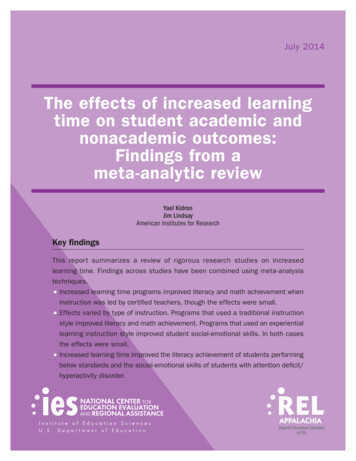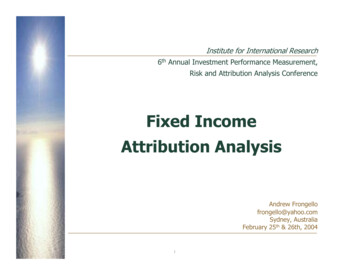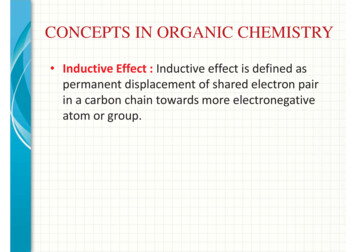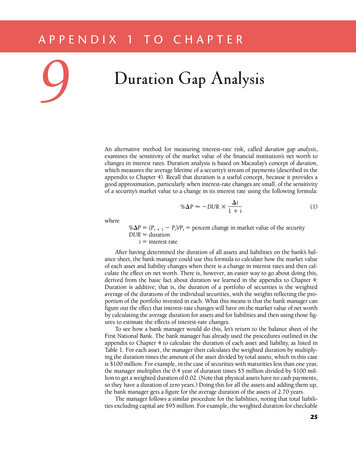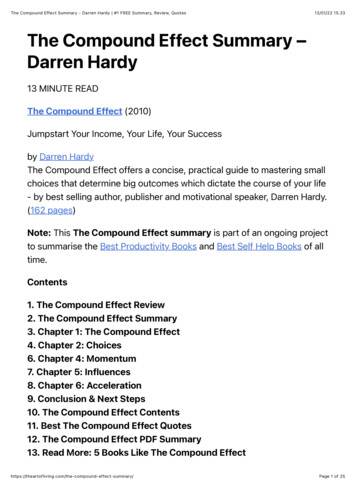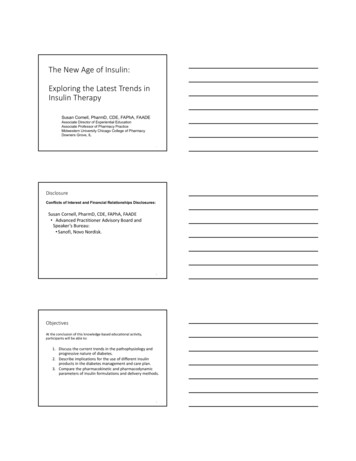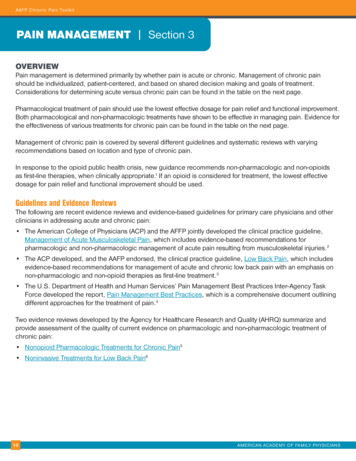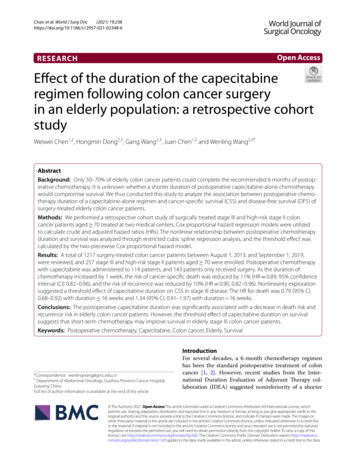
Transcription
(2021) 19:238Chen et al. World J Surg Onchttps://doi.org/10.1186/s12957-021-02348-6Open AccessRESEARCHEffect of the duration of the capecitabineregimen following colon cancer surgeryin an elderly population: a retrospective cohortstudyWeiwei Chen1,2, Hongmin Dong2,3, Gang Wang2,3, Juan Chen1,2 and Wenling Wang2,3*AbstractBackground: Only 50–70% of elderly colon cancer patients could complete the recommended 6 months of postoperative chemotherapy. It is unknown whether a shorter duration of postoperative capecitabine-alone chemotherapywould compromise survival. We thus conducted this study to analyze the association between postoperative chemotherapy duration of a capecitabine-alone regimen and cancer-specific survival (CSS) and disease-free survival (DFS) ofsurgery-treated elderly colon cancer patients.Methods: We performed a retrospective cohort study of surgically treated stage III and high-risk stage II coloncancer patients aged 70 treated at two medical centers. Cox proportional hazard regression models were utilizedto calculate crude and adjusted hazard ratios (HRs). The nonlinear relationship between postoperative chemotherapyduration and survival was analyzed through restricted cubic spline regression analysis, and the threshold effect wascalculated by the two-piecewise Cox proportional hazard model.Results: A total of 1217 surgery-treated colon cancer patients between August 1, 2013, and September 1, 2019,were reviewed, and 257 stage III and high-risk stage II patients aged 70 were enrolled. Postoperative chemotherapywith capecitabine was administered to 114 patients, and 143 patients only received surgery. As the duration ofchemotherapy increased by 1 week, the risk of cancer-specific death was reduced by 11% (HR 0.89, 95% confidenceinterval (CI) 0.82–0.96), and the risk of recurrence was reduced by 10% (HR 0.90, 0.82–0.96). Nonlinearity explorationsuggested a threshold effect of capecitabine duration on CSS in stage III disease. The HR for death was 0.79 (95% CI,0.68–0.92) with duration 16 weeks and 1.34 (95% CI, 0.91–1.97) with duration 16 weeks.Conclusions: The postoperative capecitabine duration was significantly associated with a decrease in death risk andrecurrence risk in elderly colon cancer patients. However, the threshold effect of capecitabine duration on survivalsuggests that short-term chemotherapy may improve survival in elderly stage III colon cancer patients.Keywords: Postoperative chemotherapy, Capecitabine, Colon cancer, Elderly, Survival*Correspondence: wenlingwang@gmc.edu.cn2Department of Abdominal Oncology, Guizhou Province Cancer Hospital,Guiyang, ChinaFull list of author information is available at the end of the articleIntroductionFor several decades, a 6-month chemotherapy regimenhas been the standard postoperative treatment of coloncancer [1, 2]. However, recent studies from the International Duration Evaluation of Adjuvant Therapy collaboration (IDEA) suggested noninferiority of a shorter The Author(s) 2021. Open Access This article is licensed under a Creative Commons Attribution 4.0 International License, whichpermits use, sharing, adaptation, distribution and reproduction in any medium or format, as long as you give appropriate credit to theoriginal author(s) and the source, provide a link to the Creative Commons licence, and indicate if changes were made. The images orother third party material in this article are included in the article’s Creative Commons licence, unless indicated otherwise in a credit lineto the material. If material is not included in the article’s Creative Commons licence and your intended use is not permitted by statutoryregulation or exceeds the permitted use, you will need to obtain permission directly from the copyright holder. To view a copy of thislicence, visit http:// creat iveco mmons. org/ licen ses/ by/4. 0/. The Creative Commons Public Domain Dedication waiver (http:// creat iveco mmons. org/ publi cdoma in/ zero/1. 0/) applies to tabine duration on CSS in this group wasfound. Strict statistical adjustment was applied to minimize residual confounders in this study.There are still some limitations of our study. First, wecould not evaluate the effect of postoperative chemotherapy duration of 5-fluorouracil alone or other regimens since the regimen applied for elderly patients withcolon cancer was capecitabine in both medical centers.A multicenter study is necessary to extract more conclusions. In addition, the number of cases with the endpoint was small since only 43 (43/257) deaths occurredduring our follow-up. It may be possible to increasethe robustness of this study by extending the follow-uptime to increase the number of end-point events. Second, bias could be caused by unmeasured confoundersand residuals, but the sensitivity analysis indicated thatPage 9 of 10the association between postoperative chemotherapyduration and CSS was robust. Third, dose reduction,significant delay, and compliance were not reported.Previous studies indicated decreased renal functionand an increased number of comorbidities were correlated with reductions of the capecitabine dose [25].Patients may need to receive 70% relative dose intensity to improve their 5-year OS [26]. Currently, a trial isongoing to explore this issue [27].ConclusionsIn conclusion, the postoperative capecitabine durationwas significantly associated with a decrease in deathrisk and recur
regimen, but it is still controversial to administer oxalipl-atin-containing regimens for patients 70 years or older. A uoropyrimidine alone regimen is still the recommended postoperative protocol for elderly patients in clinical practice [5, 7]. e limited number of elderly participants and the dierent recommended chemotherapy regimens




